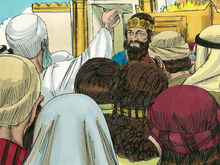Jehoshaphat’s family tree
By Mark Morgan | Family trees

King David, Solomon, Rehoboam, Abijah, Asa and then Jehoshaphat: this is Jehoshaphat’s family tree.
King Jehoshaphat was a descendant of King David, from the tribe of Judah, and began to reign over Judah about 100 years after the death of King David. He was a righteous and faithful king who would be high on the list of the best kings of Judah – although he had a problem with being too tolerant of evil people.
A family tree centred on King Jehoshaphat is included below. The family tree extends up to King David in simplified form, however the generations around Jehoshaphat include much more detail.
The family tree of David (whose descendants became the royal family of the kingdom of Judah) contains quite a few women who were not Jewish.
Many of the kings had large numbers of wives and/or concubines:
We do not know how many wives Jehoshaphat himself had, but we know that he had seven sons. Six were murdered by the oldest son Jehoram/Joram after he became king. Interestingly, two of the sons had the same name: Azariah. It is possible that in one or both cases, the name should be connected with the name before or after it in the list, which would reduce the number of sons by one or two.
Kings over Judah and Israel shared a few names:

Now available with pre-order savings here.
The information in the article above and shown in Jehoshaphat’s family tree can be found in the Bible books of Ruth, 1 & 2 Samuel, 1 & 2 Kings, 1 & 2 Chronicles and Jeremiah.
See also the Wikipedia article “Kings of Israel and Judah”.
Subscribe to our newsletter
Enjoyed this article? Articles on this site summarise the research we do in writing our Bible-based fiction. If you enjoy reading real Bible-based fiction or are willing to give it a try, enter your name and email address in the fields below, then click "Subscribe". You'll get a new micro-tale, or an informative article every week, as well as occasional special offers from Bible Tales Online. You can unsubscribe at any time.
See our Privacy Policy.